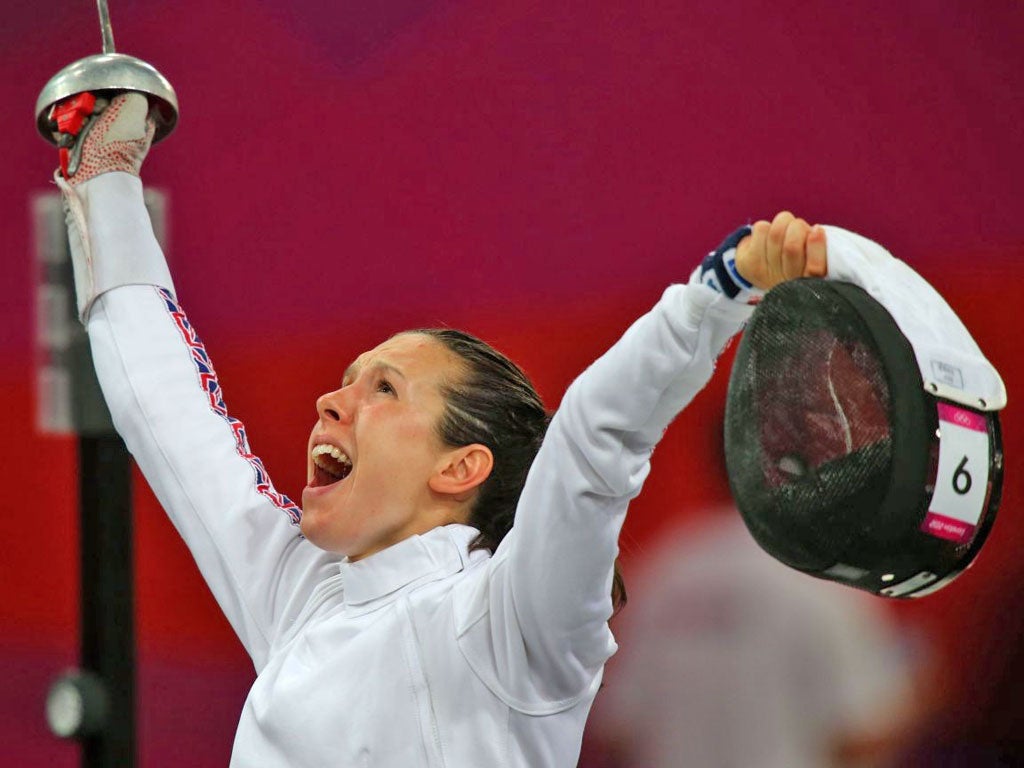Pentathlon: All-round Samantha Murray keeps GB in the medals to the end

Your support helps us to tell the story
From reproductive rights to climate change to Big Tech, The Independent is on the ground when the story is developing. Whether it's investigating the financials of Elon Musk's pro-Trump PAC or producing our latest documentary, 'The A Word', which shines a light on the American women fighting for reproductive rights, we know how important it is to parse out the facts from the messaging.
At such a critical moment in US history, we need reporters on the ground. Your donation allows us to keep sending journalists to speak to both sides of the story.
The Independent is trusted by Americans across the entire political spectrum. And unlike many other quality news outlets, we choose not to lock Americans out of our reporting and analysis with paywalls. We believe quality journalism should be available to everyone, paid for by those who can afford it.
Your support makes all the difference.Samantha Murray ensured that Britain bade a medal-winning farewell to the London Olympics here last night when she won a silver in the modern pentathlon, the final event of the 2012 Games. Amid joyous scenes at Greenwich Park, surely one of the most spectacular venues at these Olympics, the 22-year-old student held off the challenge of Brazil's Yane Marques to finish second behind the gold medal winner, Lithuania's Laura Asadauskaite.
Even if Murray was unable to take Britain's final gold medal tally up to the 30 mark, she could be proud of her performance in this most demanding of sports, which involves running, swimming, showjumping, fencing and shooting.
Murray, who returned to the sport only three years ago after taking a break because of academic pressures, is studying French and Political Studies at the University of Bath, where the Pentathlon GB high-performance centre is located. She took bronze at the World Championships this year, where her fellow Briton, Mhairi Spence, who could finish only 21st yesterday, took gold.
The modern pentathlon, first included in the Olympics exactly 100 years ago, is regarded by many as the event that best embodies the spirit of the Games. The brainchild of Baron Pierre de Coubertin, the founding father of the modern Olympics, it is based on the 19th-century legend of a young French cavalry officer who was sent on horseback to deliver a message and had to ride, fence, shoot, swim and run during the course of his mission.
Military men won the first seven Olympic titles. In 1912 a 26-year-old American army lieutenant, George S Patton Jnr, who played a significant role in the Second World War as a general, finished fifth. He had prepared for the cross-country run with an injection of opium.
Eastern Europeans have traditionally dominated the men's competition, but Britain has a fine record in the women's event, which became an Olympic sport only 12 years ago. It clearly attracts brainy competitors. Stephanie Cook, a doctor with degrees at both Oxford and Cambridge, won in Sydney, Murray is at university and Spence has a degree in coach education and sports development.
Originally contested over several days, the event is now completed in a single day. It began yesterday with fencing at the "Copper Box" venue, with all 36 competitors facing each other in one-minute bouts, and was followed by a 200m freestyle swim at the Aquatics Centre before the finale at Greenwich Park: showjumping, then the combined running and shooting, in which the athletes ran 3,000m through Greenwich Park, stopping three times to shoot at five targets, which they have to hit before continuing.
The showjumping is arguably the biggest test. They have just 20 minutes in the warm-up arena over five practice jumps to get to know their horses. Several fell from their mounts, including Mexico's Tamara Vega, whose horse managed to jump one fence successfully while she clung to its undercarriage, having been thrown out of the saddle.
The leader after the opening three events starts the combined running and shooting first, with the rest having a one-second handicap for every four points by which they trail, ensuring that the first, second and third competitors over the line win gold, silver and bronze respectively.
Murray, 16th in the fencing, was third overall after a fine swim and looked set for a clear equestrian round until bringing down two late fences, but still went into the finale in fourth, starting 8sec behind the joint leaders, Asadauskaite and Marques.
Thanks to some sharp shooting, Murray went third midway into the finale and second after the final shoot. When the athletes re-entered the main arena for the last time Murray held a narrow advantage over Marques. Roared on by the crowd, she maintained that to take the silver behind Asadauskaite.
Join our commenting forum
Join thought-provoking conversations, follow other Independent readers and see their replies
Comments